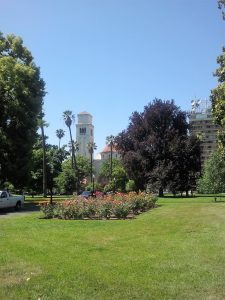
Luke 3:7-9
He then said to the crowds who came out to be baptized by him, “Brood of vipers! Who warned you to flee from the coming wrath? Therefore produce fruit consistent with repentance. And don’t start saying to yourselves, ‘We have Abraham as our father,’ for I tell you that God is able to raise up children for Abraham from these stones. The ax is already at the root of the trees. Therefore, every tree that doesn’t produce good fruit will be cut down and thrown into the fire” (CSB).
John the Baptist did what the Lord called him to do. He went out in the desert and proclaimed a baptism of repentance for the forgiveness of sins (Luke 3:3 CSB). It seemed like an unlikely and unpromising place to start a great work of God, such as the coming of the Messiah was promised to be (cf. Isaiah 35.) However, God’s ways are not our ways (cf. Isaiah 55:8). Who would go out into the desert to hear a preacher? The Lord did everything to make sure that John’s ministry would not rest in the power of man but the power of God. This is what most contemporary churches need to hear, because their “back door is as big as their front door.” Human schemes are no substitute for God’s word, prayer, and the power of the Holy Spirit. Some churches will do some sort of “40 Days of Prayer” program, be excited during it, and then… “We prayed for forty days, revival didn’t come, so let’s try something else.” That was not what John the Baptist did. He went out to the desert, preached the Lord’s message, and God sent the people. Crowds came to be baptized by him with a baptism of repentance. So then, what were John’s sermons like?
He did not try to please people (3:7). You do not please people by calling them a brood of vipers! Imagine entering any contemporary church and being a viper, which is clearly symbolic of being an evil person. The crowds in our time would not stay; they would walk out. Contemporary churches are ashamed of sin and afraid to call people sinners. They want everyone to feel comfortable. They want to be thought well of in their local community. They want everyone to like them. John the Baptist lacked such concerns. Please listen carefully. I am not talking about being rude and obnoxious. We ought to welcome people with joy. But that must never obscure the truth of the sinfulness of all people everywhere. We must tell people who they are in the presence of the holy God. That is what John was doing as he preached to his people. He was not afraid to challenge people “in his church” that they might actually be a brood of vipers! How would you react if your pastor dared to say something similar in your local church this Sunday?
He told people to change (3:8). Repentance is a change of mind, as we said in our previous post in this series. Repentant people think differently in their hearts about God, themselves, sin, Christ, and the way of salvation. This inward turn produces changes in people, both internally (ideas, attitudes, expectations, etc.) and externally in the behavior. The repentant person changes the way they walk and talk. By the way, many professing Christians need to stop using the substitute obscene and profane language they use to color their speech. So that no one misses the point, I mean all the substitute “F” words and “bathroom” words. Consider Ephesians 4:29; 5:4; Colossians 3:8. Crude speech is not the right means to lead others in godly ways. The fruit of repentance is godliness, the character that shows that a person is being renewed in knowledge in the image of its Creator (Colossians 3:10 NIV). It is the fruit of the Spirit (Galatians 5:22-23) and “the new clothing” of the new person (Colossians 3:12-17). It is what we add to our faith (2 Peter 1:5-8 NIV).
He turned people from false hopes (3:8). As the last of the old covenant prophets and the forerunner of the new age, John warned the people not to trust in their ethnic heritage. Far too many rely on their descent for assurance that God accepts them. The people of God in the new covenant are only repentant believers in the Lord Jesus Christ. Your physical heritage counts for nothing in God’s sight (John 1:11-13; Romans 2:9; 3:23; 9:6-8; Colossians 3:11). What does count is the grace of God freely given through Jesus Christ. In him, you can be part of the people of God!
He warned them of the wrath to come (3:9). Yes, John did not make people feel comfortable. He wanted all outside of God’s grace to feel very uncomfortable! Again, the contemporary church doesn’t want to offend anyone. Political correctness rules the day, unless it is something distasteful to their own political agenda, but that is another subject. People do not want to hear of the fires of the wrath of God. They are like people whistling as they pass a cemetery, but in this case, it is not a cemetery but hell itself. The are like toddlers playing “peekaboo”, assuming that if they don’t hear about hell, it doesn’t exist. John told the crowds the truth. We do not help people by failing to tell them their very serious problem before the throne of God.
John the Baptist was faithful to his mission. May we be faithful to the mission the Lord Jesus has given us (Luke 24:45-47).
Grace and peace, David


 Genesis 43:1-14
Genesis 43:1-14
 Psalm 25:8-15
Psalm 25:8-15 Matthew 6:34
Matthew 6:34 Luke 17:32
Luke 17:32 3 John
3 John Psalm 55:22
Psalm 55:22 Deuteronomy 33:27a
Deuteronomy 33:27a